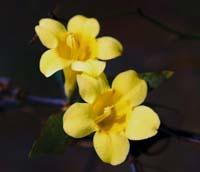Micking the nectar does not imply great advantages

As an anti-nectar thief system, it may be appropriate to mimic the nectar, but when it comes to reproduction, this hurts the plant. At least that's what happens to Karolina's American jasmine.
Apparently, this jasmine has evolved to create a more bitter nectar, adding a compound called gelsemine. Therefore, they have analyzed the flowers of different concentrations of gelsemine for their study. Bitter nectar plants (nectar with a lot of gelsemine) have seen that they attract less pollinating bees --nectar thieves are less, that is, insects that leave without collecting pollen without nectar do not like. But they have also seen that the pollen that expands for reproduction reaches fewer plants.
The goal of evolution is always that a species survives, but it seems that it does not always succeed.





